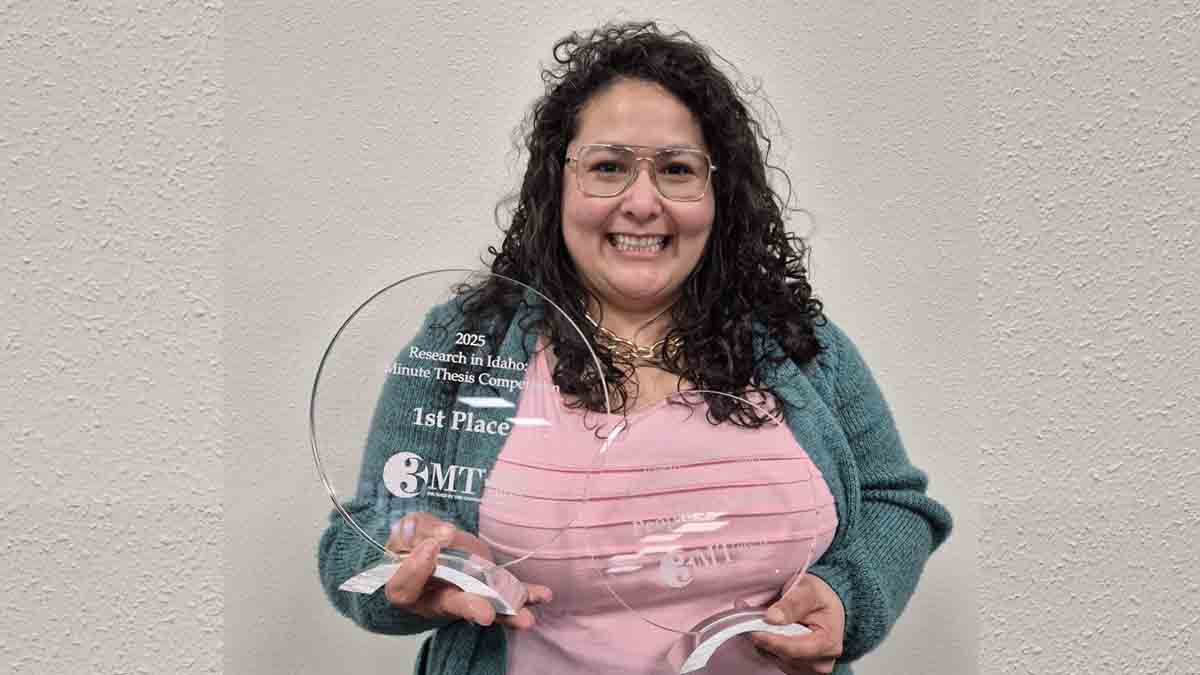3-Minute Thesis Winner
February 19, 2025
Rita Franco, a University of Idaho doctoral student studying nutritional sciences, chose to leave her native Guatemala and continue her education in the U.S. in part because she wanted to improve her English-speaking skills.
She’s checked that box in a big way.
On Feb. 11, Franco placed first in the Idaho Statewide 3-Minute Thesis contest, which is a public speaking competition in which participants are tasked with presenting their research to live and virtual audiences in three minutes or less.
Franco, who is studying under Assistant Professor Ginny Lane in the Margaret Ritchie School of Family and Consumer Sciences, faced 11 other graduate students from U of I, Boise State University and Idaho State University during the contest, hosted at the Bennion Student Union Building at U of I Idaho Falls. She also won the People’s Choice Award and took home $2,500 in prize money.
She qualified for state by finishing second and earning the People’s Choice Award during U of I’s 3-Minute Thesis contest, hosted Nov. 14 in the Pitman Center, and she will now move on to compete against winners from 14 western states in Colorado.
“Winning this kind of competition in a country that is not yours, in a language that is not ours, it’s so meaningful,” said Franco, whose long-term goal is to generate scientific evidence for decision-makers to use in developing food-security strategies. “It’s giving me more confidence. It’s made me feel that I can do more things.”
Her talk, called “Improving Child Nutrition Through Household Poultry Projects in Guatemala,” describes her research under Lane analyzing the dramatically improved health outcomes among rural Guatemalan children who consume at least one egg per day.
Franco came up with a memorable introduction to hook an audience: “So I’ve heard that people in the United States say, ‘An apple a day keeps the doctor away.’ But in Guatemala, my home country, we must say, ‘One egg a day keeps the stunting away.’”
In her brief speech, Franco describes how Lane started the egg nutrition project in 2019, providing chicken coops to families in rural Guatemala and guidance to help them raise eggs to supplement their diet and sell commercially. Lane and her research team recorded data on the overall wellbeing of the children of 10 families who were raising eggs through the study and returned for follow-up testing of the children over the course of six years. The researchers concluded children who regularly ate eggs were far less likely to suffer chronic health problems and stunted growth and development.
“In those communities, around 60% of children under 5 are stunted, and stunting has a lot of impact in a child’s life,” Franco said. “It reduces learning capacity. Children who are stunted will not have good grades in school, and in adult life they probably can only work in crops.”
Franco’s talk also cites recent economic data from the World Bank, finding every dollar invested in combatting malnutrition returns $23 worth of benefits.
“I think my main objective would be to create this evidence and to advocate to society, local authorities and donors to invest in nutritional projects,” Franco said. “I am trying to create this evidence to guide what people who make the decisions can use to improve their strategies.”
Taking an eight-week special-topics course designed to help structure and practice 3-Minute Thesis presentations was key to Franco’s success.
”I believe incorporating courses like this is highly beneficial for all graduate students, as it enhances our ability to communicate complex concepts effectively,” Franco said.
For her doctoral dissertation, Franco has been working under Lane to understand the reasons why Southern Idaho Latinos suffer from diabetes at much higher rates than other ethnic groups. The problem is especially acute among Latina women, who are 17% more likely to contract diabetes than white women.
“One of the important things the women mention is they don’t have time to have a healthy lifestyle because they work, and they also have to take care of their family. They don’t think about themselves,” Franco said.
In Guatemala, Franco served for two years as coordinator of an entity that advised the government on social welfare programs. She also worked for nonprofit organizations in her country, including serving seven years with World Vision Guatemala.
After earning her doctorate, Franco intends to return to Guatemala and devote herself toward lifting rural residents out of poverty.

About the University of Idaho
The University of Idaho, home of the Vandals, is Idaho’s land-grant, national research university. From its residential campus in Moscow, U of I serves the state of Idaho through educational centers in Boise, Coeur d’Alene and Idaho Falls, nine research and Extension centers, plus Extension offices in 42 counties. Home to more than 12,000 students statewide, U of I is a leader in student-centered learning and excels at interdisciplinary research, service to businesses and communities, and in advancing diversity, citizenship and global outreach. U of I competes in the Big Sky and Western Athletic conferences. Learn more at uidaho.edu.






